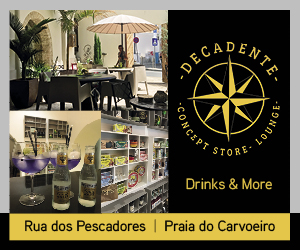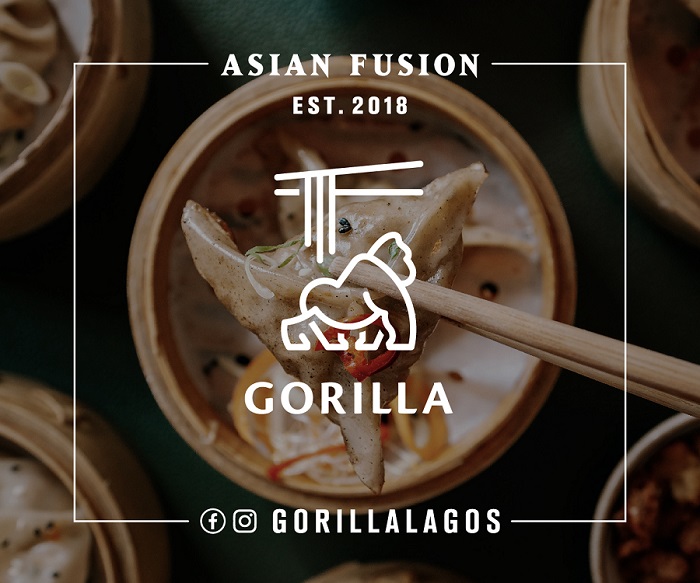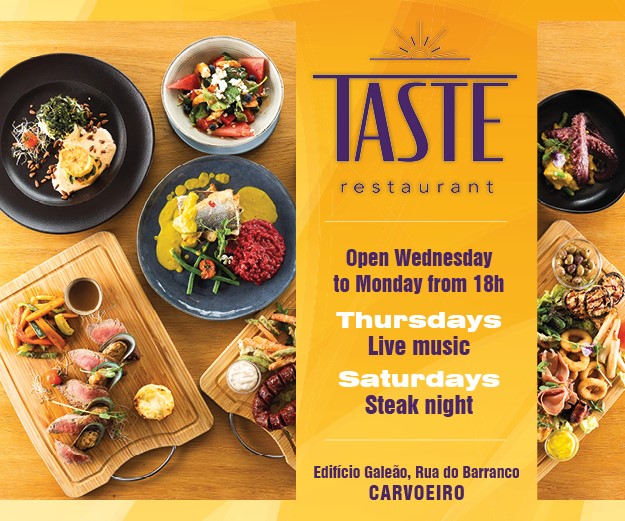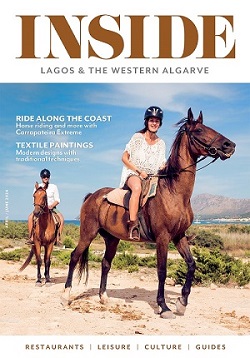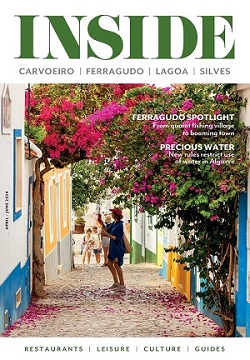A hard-working couple used their downtime during the pandemic productively to turn a fascinating idea into the Algarve’s first urban organic mushroom farm
– August 22, 2022
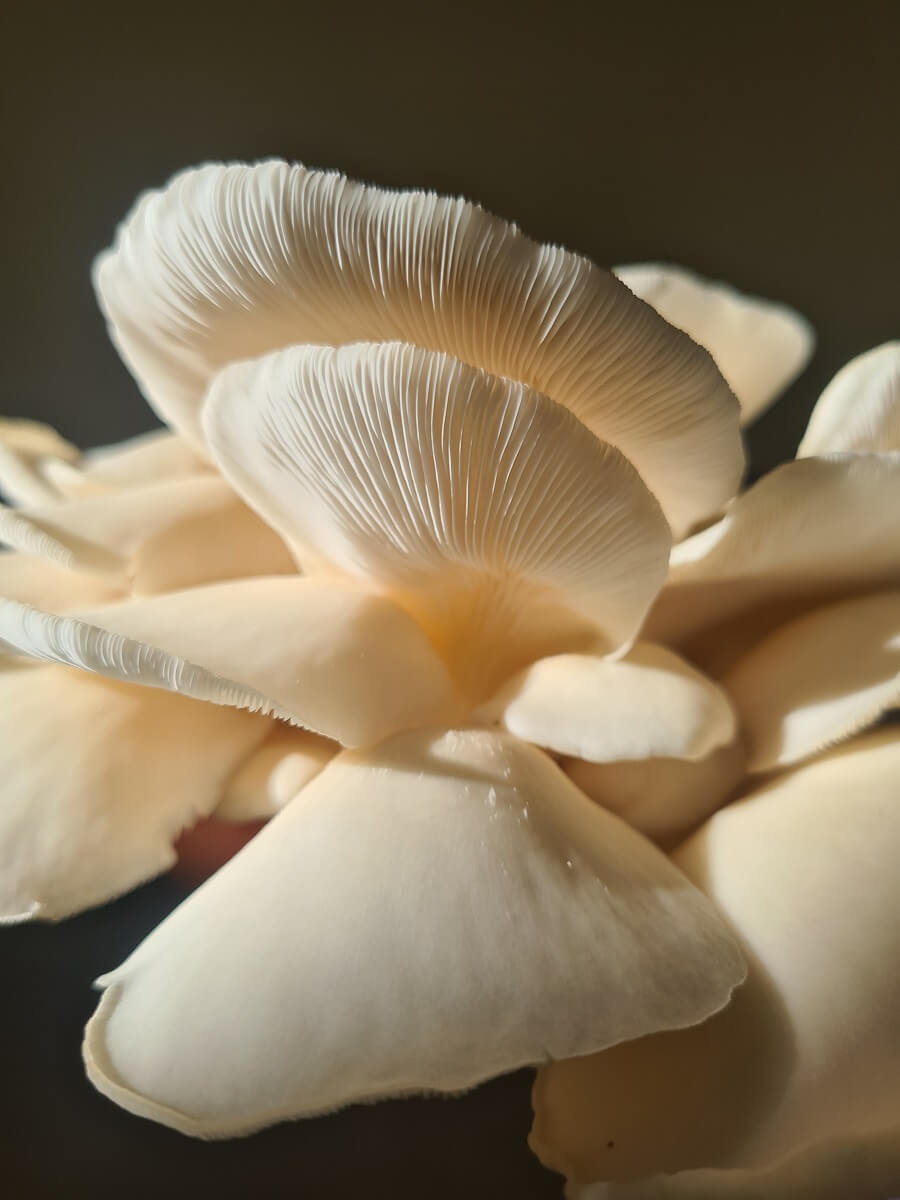
Mushrooms produced organically in the basement of a store in Portimão have quickly become all the rage among many of the Algarve’s best restaurants and their chefs.
Gribb, the Russian name for ‘mushroom’ or ‘fungi’, is the Algarve’s first urban organic mushroom farm, having opened in December 2021 near Portimão’s Largo da Mó square, on the busy shopping street Rua das Lojas.
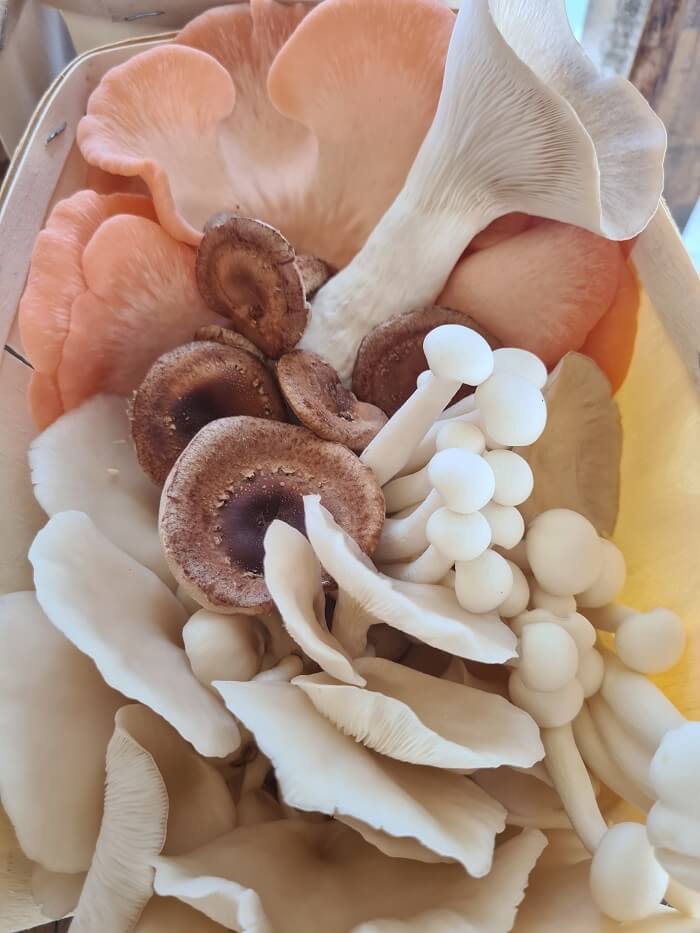
Day’s harvest
Production has increased over the last few months from 10 mushroom species to 14, including household names like shiitake, but mostly types that you will be hard-pressed to find on supermarket shelves in the Algarve, such as lion’s mane or pink oyster.
Cláudia Martins and Ion Volosciuc are both aged 34, vegetarians and try to live a life that is “as sustainable as possible”. They spent six years living in London before they decided to move back to Portimão to pursue this new-found dream – to open their own organic, sustainably-minded mushroom farm.
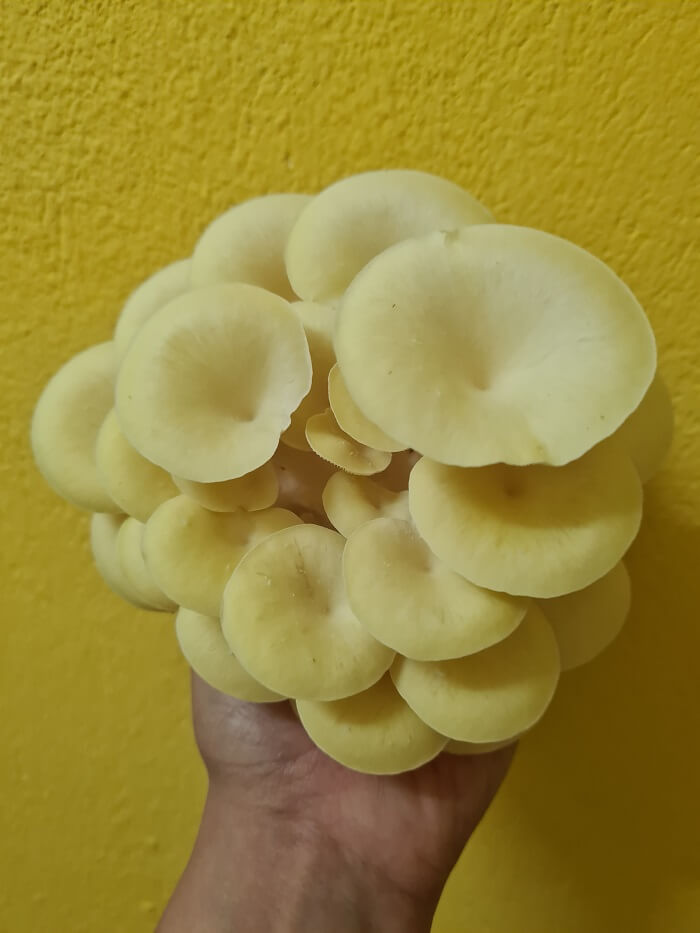
“I was always fascinated by agriculture, but I never imagined myself doing it,” said Ion, a self-described “high-school dropout” who had worked for nearly 20 years in the hotel and restaurant sectors, mostly in managerial positions. Meanwhile, Cláudia studied optometry and was working in her field in London.
But when Covid-19 broke out and we were all confined to our homes, Ion found himself discovering more and more about the different uses of mycelium – the vegetative body for fungi that produces mushrooms. The seed was planted in their minds and, after months of studying and researching how they could use mycelium to grow their own mushrooms in an urban environment, they decided to bite the bullet and move back to Portimão to follow their new-found dream.
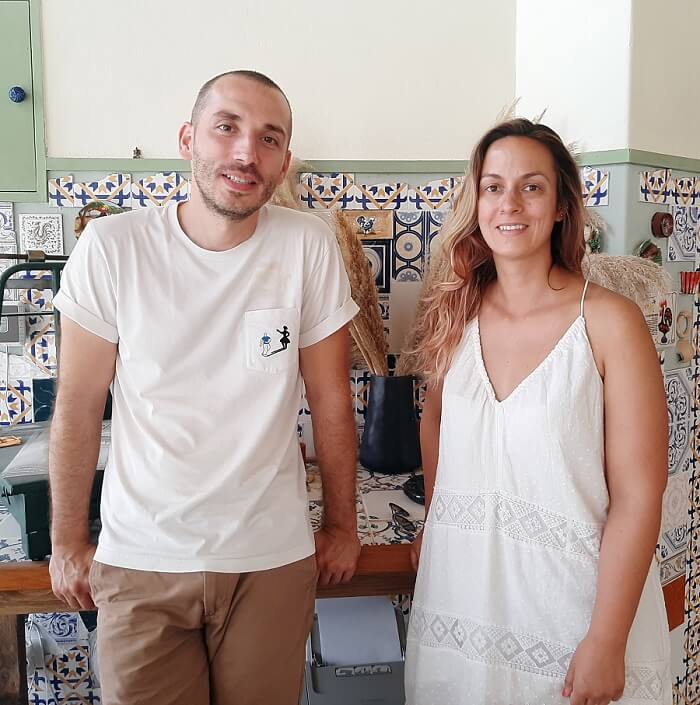
Ion Volosciuc and Cláudia Martins ©Michael Bruxo
“We put all our eggs in the same basket,” Ion told us. “It was kind of a kamikaze move because this isn’t a side job or a hobby for us. It is our job,” Cláudia added. Leaving their old lives behind in London, Ion and Cláudia found a store in Portimão where they could set up their new operation. “There was a lot of studying going into this. We understood the theory and, on paper, it seemed very doable. We created the project, had a business plan, it was well-structured, but we had never actually experimented growing the mushrooms,” Ion said.
However, the risk paid off. Their experiments were successful, and the major change they made to the usual urban mushroom production process worked. “What we are doing is not new, except there is a little catch. While others use wood pellets as their substrate for growing mushrooms, we use wood waste from carpentry companies,” said Ion. “It is basically sawdust free from any kind of chemicals or toxic compounds. For carpenters, it is waste that is usually burnt or thrown out. I have friends in Monchique who work in the industry, and we’re actually doing them a favour by taking it away,” Ion explained.
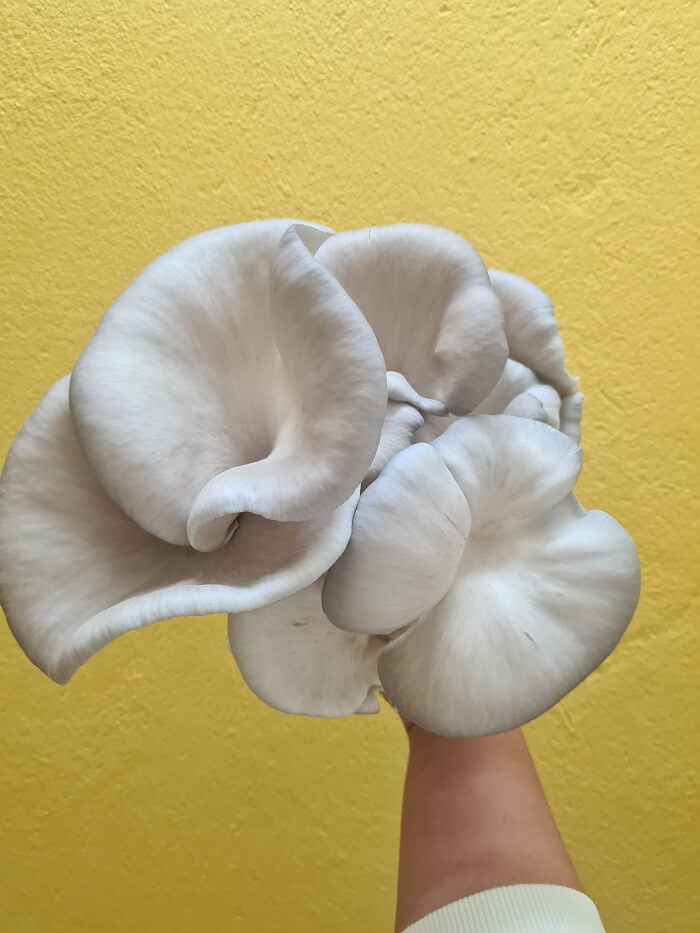
pleorotus columbinus – Blue oyster
We were taken on a tour of the production process, which includes several steps, such as introducing the mycelium to the substrate (the sawdust) and allowing it to grow throughout a series of different steps until it is finally placed inside a special tent to reach the final stage of growth. After trying the mushrooms for themselves for the first time – “and living to tell the tale”, as they put it – it was time to start contacting local restaurants and hotels. Ion and Cláudia put together a list of the restaurants and hotels that they wanted to work with and decided to go knocking on doors. It did not take long before the mushrooms became a hit among chefs in the Algarve.
“I worked in the hotel sector for nearly 20 years, so I worked very closely with chefs. I know that when there is a very good product on the market, chefs don’t mind paying more or waiting however long it takes to have it, because they like working with quality products. We take pride in what we do, and that makes a difference,” said Ion, adding that word of mouth played a big role in spreading their farm’s name. “It’s just the two of us working here,” Cláudia explains. “We deliver the mushrooms ourselves. We wouldn’t want it any other way. We look after the mushrooms from start, all the way to delivery.”
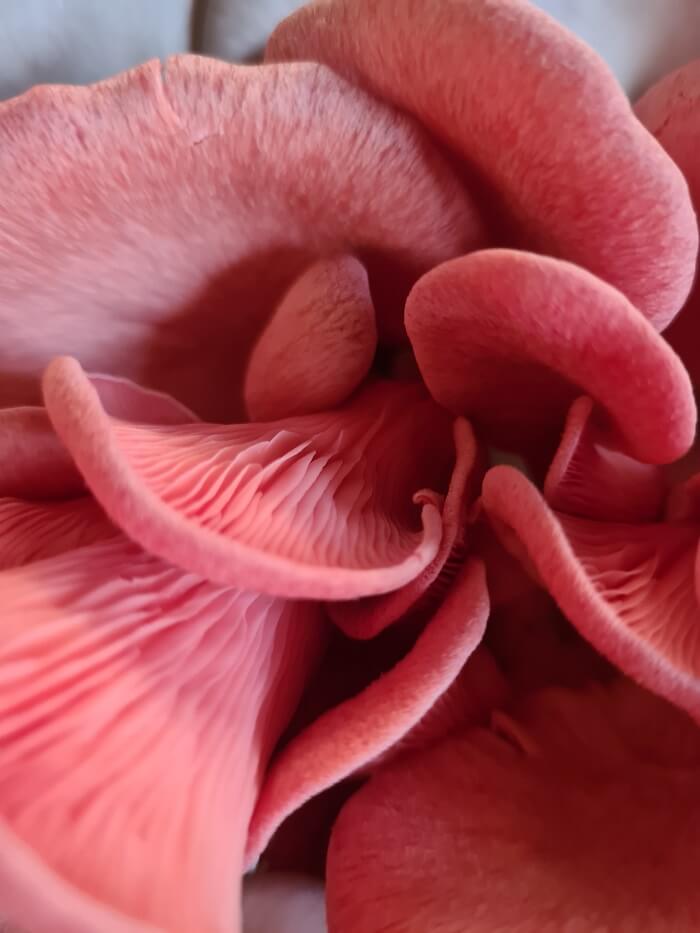
pleorotus djamor – Pink oyster
Success has been so great that Ion and Cláudia say their current store is already proving too small to meet production needs. “We will eventually move to a bigger space, but even then, we will do things the same way because it is the only way that makes sense to us. We have already been approached by people who wanted to export the mushrooms to France and Denmark, or introduce a more industrialised production method, but we said no,” Ion said. “We always said that if we had to do something for the money, it wouldn’t be done well. In our case, we love what we do, and we do it with care, love and dedication. And that plays a big role in the final result.”
The demanding nature of the job means there is little time for holidays or even a day off. But seeing their project come to life so successfully is what proves to them that they made the right decision. “It’s a very rewarding feeling. It motivates us and proves to us that we cannot give up after coming this far,” said Ion.
So, what lies ahead for Gribb now that it has established itself in the Algarve? “We don’t want to just produce fresh mushrooms,” Ion guaranteed. “Our next step is to create mushroom supplements and then mycelium-based biomaterials and enter the world of mycelium-based alternatives to meat,” he said, adding that the plan is to move forward with these ideas in the next two to three years. “Urban farming is the future. All the spaces that we (humans) have destroyed to build cities can now be used to grow food – and we want to be a part of that.”
Where can you buy the mushrooms?
Gribb’s mushrooms can be ordered directly on their website and picked up at the store. The couple also sell their mushrooms at Vivo Mercado, a weekly organic market held on Wednesdays in Lagos, and at Mercearia Bio store in Portimão. The price of an online order of the daily harvest mix starts at €8.
Visit Gribb‘s website or follow on Instagram and Facebook.

